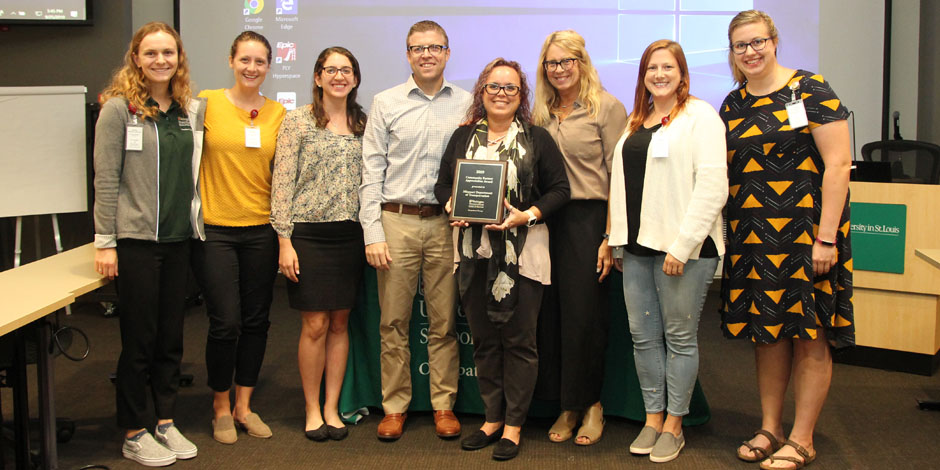Rehabilitation and Participation Science
Program in Occupational Therapy
by Michele Berhorst • September 26, 2019

Members of the Driving and Community Mobility Laboratory with Jon Nelson and Amity Jeffries (center) of MoDOT.
The Program in Occupational Therapy held its third annual Community Partners Celebration Event on Sept. 25. Organized by the Program’s Community Engagement Council, the event brings together and recognizes organizations that provide research, educational and clinical experiences to our students. This year, two organizations were presented with the Community Partner Appreciation Award: the Missouri Department of Transportation and the Sickle Cell Association of St. Louis.
Missouri Department of Transportation (MoDOT) has funded research at Washington University for the past 12 years through the Driving and Community Mobility Laboratory, led by Peggy Barco, OTD, OTR/L, SCDCM, CDRS, FAOTA. “Our mutual mission is to keep older adults driving safely for as long as possible and to provide suitable alternatives to driving,” says Barco, who nominated MoDOT. “In doing so, we support human health and participation by facilitating safe and reliable modes of transportation to connect persons to their important daily activities.”
MoDOT‘s funding has supported the development of fitness-to-drive screens for clinicians, standardized tools to assess on-road driving performance, and best practices in assisting older adults with alternative transportation after driving cessation. Barco and MoDOT are currently collaborating with state highway patrol and licensure renewal offices to determine whether there are ways to use a traffic sign identification test in a more standardized and informative manner during licensure renewal to promote driving safety throughout Missouri.
Students in Barco’s lab become familiar with the role of occupational therapy in determining fitness to drive by utilizing a variety of screens and assessments. “Students learn the importance of driving as an [instrumental activity of daily living] and how to address the many unique challenges faced when making decisions related to driving performance,” Barco says. “They also learn how to provide clients with appropriate community resources when driving is restricted.”
The Sickle Cell Association (SCA) of St. Louis is a not-for-profit organization that strives to diminish suffering and improve the quality of life of individuals affected by sickle cell disease (SCD). The association hosts monthly support groups and acts as a medical liaison and advocate for clients to ensure that they receive timely and effective medical care. Throughout the year, the SCA works collaboratively with a network of providers through the Integrated Health Network and Community Sickle Cell Initiative to host events throughout the St. Louis community to provide education and raise public awareness about the disease, its management and challenges.
Executive director Rosemary Britts and her team have partnered with Allison King, MD, PhD, and members of her Child Health and Education Laboratory on numerous research studies to improve the standard of care for individuals with SCD. Clinical research coordinator Taniya Varughese, MSOT, OTR/L, nominated SCA and has worked closely with the organization for several years in King’s lab.
“The SCA recognizes the importance of providing evidence-based care and interventions for the community they serve. They have a community panel of providers, patients and their families who have served as key stakeholders when we apply for grants, develop protocols and recruit participants for studies,” Varughese shares. “The SCA has served as a site for our lab to conduct focus groups with patients and families with SCD. Additionally, Rosemary has helped organize patients and their families to serve as guest speakers for an annual sickle cell lecture for our students. Many students have remarked that the lecture is an especially memorable experience because they were able to hear first-hand from those affected by the disease.”
In addition, students from King’s lab are regular volunteers at the annual Sickle Cell Stroll awareness event and monthly support groups hosted by the SCA. The events help students understand more about SCD; the numerous socioeconomic barriers to care faced by this population; their need for holistic, personalized care; and, in particular, how occupational therapy services can be beneficial when living with SCD.
Varughese feels the lab is able to have a close relationship with the SCD community because of the SCA’s commitment to serve this population. “Rosemary is a warrior in advocating for individuals with SCD, and she always puts the community she serves first. She has challenged us on many occasions to identify the needs of the community directly from those living with SCD, and she and her team will be instrumental in designing future interventions to meet those needs and better serve this population.”
We welcome inquiries from prospective students, potential collaborators, community partners, alumni and others who want to connect with us. Please complete the form below to begin the conversation.
Schedule an Info Session
We are excited that you are considering applying to the Program in Occupational Therapy at Washington University. Please join us for a Zoom Information Session for either our entry-level MSOT or OTD degrees or our online Post-Professional OTD. Current faculty members will discuss the degree program and answer any question you may have. We are offering these sessions on the following days and times. The content is the same for each one, so you only need to sign up for one.
Upcoming ENTRY-LEVEL Degree ZOOM Info sessions:
Schedule an Entry-Level Info Session
Upcoming PP-OTD Degree ZOOM Info session: